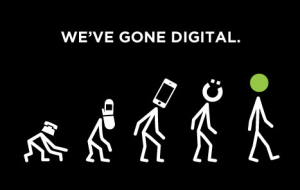You are viewing our site as a Broker, Switch Your View:
Agent | Broker Reset Filters to Default Back to ListDigital Disruption Will Soon Be Touching a Brokerage Very Near to You
October 27 2014
 In today's rapidly transitioning North American real estate industry, mergers and acquisitions are to digital disruption what troop movements are to invasions. Like the lightning bolt before the thunder, each of the recent mergers and acquisitions constitutes due notice of yet another significant disruption that will occur six to eight months down the road. The growing number of acquisitions over the past few months is another wake-up call relative to what the marketplace, the transaction and the industry itself will look like next spring.
In today's rapidly transitioning North American real estate industry, mergers and acquisitions are to digital disruption what troop movements are to invasions. Like the lightning bolt before the thunder, each of the recent mergers and acquisitions constitutes due notice of yet another significant disruption that will occur six to eight months down the road. The growing number of acquisitions over the past few months is another wake-up call relative to what the marketplace, the transaction and the industry itself will look like next spring.
Despite the formidable amount of the industry's literature that has been given over to the subject during the past year, digital disruption remains a relatively obscure concept for most industry executives, managers and workers. While such a lack of knowledge might not normally have major consequences, in this case unawareness will be cataclysmic. Most acquisitions represent the tip of the digital disruption sword. Prior to making the purchase, the acquiring entity has spent many months envisioning, designing and preparing to implement its disruptive strategy. Taken together, one must say that everyone in the North American real estate industry is on notice that the real estate business, as most have known it, is nearing the end of its long and honorable run.
Based upon an analysis of what is known today, it would appear that the lead columns of the digital disruption invasion will likely occur along the front that exists between the real estate service provider and the consumer. As Zillow has already established, this is probably the weakest point in the traditional real estate service provider's defenses.
The customer relationship and experience has also been the operational area almost totally ignored during the past several years while the industry has focused its attentions on matters such as syndication, off-MLS marketing practices, technologies, MLS practices, referrals, leads and the ownership of data. As a result of these decisions, consumers have increasingly had to find their own way through the real estate jungle. The necessity to accomplish this feat is also what has given birth to an increasingly predominant belief among consumers that the current real estate service provider value proposition may not be supporting its commission.
 This is not to suggest that it is too late for the industry or its players to recover control and get on the right track, for it is not. It is, however, to suggest that given the current dearth of attention being paid to the consumer experience, it is somewhat unlikely that the focus of the industry will change in time to effect the required recovery.
This is not to suggest that it is too late for the industry or its players to recover control and get on the right track, for it is not. It is, however, to suggest that given the current dearth of attention being paid to the consumer experience, it is somewhat unlikely that the focus of the industry will change in time to effect the required recovery.
The solution to this quandary is relatively simple. The following steps would go a long way to meeting the challenge:
The industry must double its efforts to understand how today's consumer has changed over the past few years. It has spent considerable time and effort understanding how the events of 2005 through 2010 impacted the industry itself but insufficient effort has been made to understand how this same period impacted consumers, especially those in the younger generations.
A second step is to gain an understanding relative to the difference between the traditional real estate consumer and today's digitally empowered consumer. It isn't just a matter of technical skills; rather it is an entirely new attitude and mindset brought about by the power of information.
The next step might be to better understand just how different the digital consumer experience is from the traditional one. Digital disruption is not about fusion. It is not like a local eatery suddenly mixing Asian food with southern cooking and giving it a catchy name. Digital disruption is more often about convergence. Two trends or forces collide to create something that is essentially new. In most cases any similarities between the new and the old exist only in the traditionalist's mind. Digital disruption creates new dynamics, new operating methodologies and new emotional and psychological reactions.
Continuing on, it is critical for the industry and its players to understand how companies that are leading the digital charge are dealing with transformation and change. These two factors represent a whole new arena of knowledge and competency. Digital strategists and digitally native executives are carving out new areas of power, influence and sustainability. These are not new tricks for old dogs but rather new tricks for new dogs. Traditional entities must respond by recruiting these new dogs and giving them the space and power to do their magic without a constant referral back to the "way we have always done it."
Finally, the traditional entity must recognize that much of its solution lies within its own organization. Hundreds of real estate brokerages have within their existing ranks individuals who either have the answers or are developing the answers right under the broker's nose. The traditional caste system is no longer effective, certainly not in the midst of digital disruption. It is remarkable how few brokers and brokerage executives are looking internally for solutions.
For the longest time the real estate industry saw itself as a "people" business. The interesting thing is that when its digital disruption has been completed the industry will be more of a people business than ever before. The North American real estate industry has a long history of being really good at working with people. These skills, applied to the industry's post digital disruption configuration, will put it in good stead to succeed beyond it wildest dreams moving forward. Please don't miss the opportunity; it won't be the same without you.
To view the original article, visit the RECON Intelligence Services blog.









